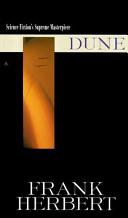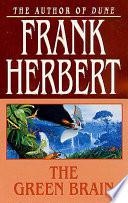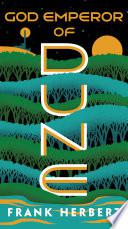Works

Children of Dune
Frank Herbert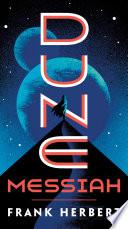
Dune Messiah
Frank Herbert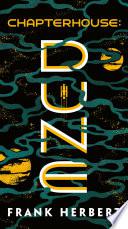
Chapterhouse: Dune
Frank Herbert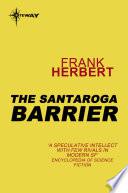
The Santaroga Barrier
Frank Herbert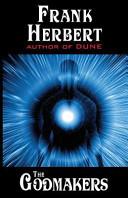
The Godmakers
Frank Herbert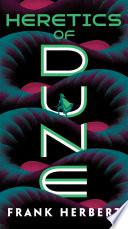
Heretics of Dune
Frank HerbertFamous Frank Herbert Quotes
“Seek freedom and become captive of your desires. Seek discipline and find your liberty.”
Source: Chapterhouse: Dune
“A man is a fool not to put everything he has, at any given moment, into what he is creating”
As quoted in Shoptalk: learning to write with writers (1990), edited by Donald Morison Murray<!-- Cook Publishers -->
General sources
Context: A man is a fool not to put everything he has, at any given moment, into what he is creating. You're there now doing the thing on paper. You're not killing the goose, you're just producing an egg. So I don't worry about inspiration, or anything like that. It's a matter of just sitting down and working. I have never had the problem of a writing block. I've heard about it. I've felt reluctant to write on some days, for whole weeks, or sometimes even longer. I'd much rather go fishing, for example, or go sharpen pencils, or go swimming, or what not. But, later, coming back and reading what I have produced, I am unable to detect the difference between what came easily and when I had to sit down and say, 'Well, now it's writing time and now I'll write.' There's no difference on paper between the two.
Frank Herbert Quotes about people
"The Plowboy Interview: Frank Herbert", in Mother Earth News No. 69 (May/June 1981)
General sources
Dune Genesis (1980)
Context: Don't give over all of your critical faculties to people in power, no matter how admirable those people may appear to be. Beneath the hero's facade you will find a human being who makes human mistakes. Enormous problems arise when human mistakes are made on the grand scale available to a superhero. And sometimes you run into another problem.
It is demonstrable that power structures tend to attract people who want power for the sake of power and that a significant proportion of such people are imbalanced — in a word, insane. … Heroes are painful, superheroes are a catastrophe. The mistakes of superheroes involve too many of us in disaster.
It is the systems themselves that I see as dangerous.
Dune Genesis (1980)
Context: Don't give over all of your critical faculties to people in power, no matter how admirable those people may appear to be. Beneath the hero's facade you will find a human being who makes human mistakes. Enormous problems arise when human mistakes are made on the grand scale available to a superhero. And sometimes you run into another problem.
It is demonstrable that power structures tend to attract people who want power for the sake of power and that a significant proportion of such people are imbalanced — in a word, insane. … Heroes are painful, superheroes are a catastrophe. The mistakes of superheroes involve too many of us in disaster.
It is the systems themselves that I see as dangerous.
Frank Herbert Quotes about time
“There is only one true wealth in all the universe--living time.”
The Green Brain (1966)
Context: There is only one true wealth in all the universe. I have given you some of it. I have given your father and your mate some of it. And your friends. This wealth is living time. Time.
Context: "A slave is one who must produce wealth for another," the Brain said. "There is only one true wealth in all the universe. I have given you some of it. I have given your father and your mate some of it. And your friends. This wealth is living time. Time. Are we slaves because we have given you more time to live?"
“No matter how finely you subdivide time and space, each tiny division contains infinity.”
Dune Genesis (1980)
Context: No matter how finely you subdivide time and space, each tiny division contains infinity.
But this could imply that you can cut across linear time, open it like a ripe fruit, and see consequential connections. You could be prescient, predict accurately. Predestination and paradox once more.
The flaw must lie in our methods of description, in languages, in social networks of meaning, in moral structures, and in philosophies and religions — all of which convey implicit limits where no limits exist. Paul Muad'Dib, after all, says this time after time throughout Dune.
"Science Fiction and a World in Crisis" in Science Fiction: Today and Tomorrow (1974) edited by Reginald Bretnor
General sources
Context: By the time we awaken faintly to the awareness that we have been socially conditioned, we find ourselves so indoctrinated that it's difficult, if not impossible, to break the old patterns … Survival pressures demanding that we evolve, grow, and change, however, continue to proliferate. We don't want to change, but the floodgates open abruptly and we are overwhelmed.
Crisis!
Frank Herbert: Trending quotes
Dune Genesis (1980)
Context: In the beginning I was just as ready as anyone to fall into step, to seek out the guilty and to punish the sinners, even to become a leader. Nothing, I felt, would give me more gratification than riding the steed of yellow journalism into crusade, doing the book that would right the old wrongs.
Reevaluation raised haunting questions. I now believe that evolution, or deevolution, never ends short of death, that no society has ever achieved an absolute pinnacle, that all humans are not created equal. In fact, I believe attempts to create some abstract equalization create a morass of injustices that rebound on the equalizers. Equal justice and equal opportunity are ideals we should seek, but we should recognize that humans administer the ideals and that humans do not have equal ability.
Frank Herbert Quotes
"Science Fiction and a World in Crisis" in Science Fiction: Today and Tomorrow (1974) edited by Reginald Bretnor
General sources
Context: The current utopian ideal being touted by people as politically diverse (on the surface, but not underneath) as President Richard M. Nixon and Senator Edward M. Kennedy goes as follows — no deeds of passion allowed, no geniuses, no criminals, no imaginative creators of the new. Satisfaction may be gained only in carefully limited social interactions, in living off the great works of the past. There must be limits to any excitement. Drug yourself into a placid "norm." Moderation is the key word…
“It is the systems themselves that I see as dangerous.”
Dune Genesis (1980)
Context: Don't give over all of your critical faculties to people in power, no matter how admirable those people may appear to be. Beneath the hero's facade you will find a human being who makes human mistakes. Enormous problems arise when human mistakes are made on the grand scale available to a superhero. And sometimes you run into another problem.
It is demonstrable that power structures tend to attract people who want power for the sake of power and that a significant proportion of such people are imbalanced — in a word, insane. … Heroes are painful, superheroes are a catastrophe. The mistakes of superheroes involve too many of us in disaster.
It is the systems themselves that I see as dangerous.
“It is not that power corrupts but that it is magnetic to the corruptible.”
Source: General sources, Chapterhouse Dune (1985)
Context: All governments suffer a recurring problem: Power attracts pathological personalities. It is not that power corrupts but that it is magnetic to the corruptible. Such people have a tendency to become drunk on violence, a condition to which they are quickly addicted.
“Without change something sleeps inside us, and seldom awakens. The sleeper must awaken.”
Variant: Without new experiences, something inside of us sleeps. The sleeper must awaken.
Source: Dune
Source: Chapterhouse: Dune
Variant: It is difficult to live in the present, pointless to live in the future and impossible to live in the past.
Source: Dune
“The purpose of argument is to change the nature of truth.”
Source: Children of Dune
Dune Genesis (1980)
Context: In the beginning I was just as ready as anyone to fall into step, to seek out the guilty and to punish the sinners, even to become a leader. Nothing, I felt, would give me more gratification than riding the steed of yellow journalism into crusade, doing the book that would right the old wrongs.
Reevaluation raised haunting questions. I now believe that evolution, or deevolution, never ends short of death, that no society has ever achieved an absolute pinnacle, that all humans are not created equal. In fact, I believe attempts to create some abstract equalization create a morass of injustices that rebound on the equalizers. Equal justice and equal opportunity are ideals we should seek, but we should recognize that humans administer the ideals and that humans do not have equal ability.
Dune Genesis (1980)
Context: Reevaluation taught me caution. I approached the problem with trepidation. Certainly, by the loosest of our standards there were plenty of visible targets, a plethora of blind fanaticism and guilty opportunism at which to aim painful barbs.
But how did we get this way? What makes a Nixon? What part do the meek play in creating the powerful? If a leader cannot admit mistakes, these mistakes will be hidden. Who says our leaders must be perfect? Where do they learn this?
Dune Genesis (1980)
Context: No matter how finely you subdivide time and space, each tiny division contains infinity.
But this could imply that you can cut across linear time, open it like a ripe fruit, and see consequential connections. You could be prescient, predict accurately. Predestination and paradox once more.
The flaw must lie in our methods of description, in languages, in social networks of meaning, in moral structures, and in philosophies and religions — all of which convey implicit limits where no limits exist. Paul Muad'Dib, after all, says this time after time throughout Dune.
“The thing we must do intensely is be human together. People are more important than things.”
"Introduction" to New World or No World (1970)<!-- an anthology of environmental writing -->
General sources
Context: The thing we must do intensely is be human together. People are more important than things. We must get together. The best thing humans can have going for them is each other. We have each other. We must reject everything which humiliates us. Humans are not objects of consumption. We must develop an absolute priority of humans ahead of profit — any humans ahead of any profit. Then we will survive. … Together.
General sources
Context: The thing we must do intensely is be human together. People are more important than things. We must get together. The best thing humans can have going for them is each other. We have each other. We must reject everything which humiliates us. Humans are not objects of consumption. We must develop an absolute priority of humans ahead of profit — any humans ahead of any profit. Then we will survive. … Together.
"Introduction" to New World or No World (1970)<!-- an anthology of environmental writing -->
"Science Fiction and a World in Crisis" in Science Fiction: Today and Tomorrow (1974) edited by Reginald Bretnor
General sources
Context: The current utopian ideal being touted by people as politically diverse (on the surface, but not underneath) as President Richard M. Nixon and Senator Edward M. Kennedy goes as follows — no deeds of passion allowed, no geniuses, no criminals, no imaginative creators of the new. Satisfaction may be gained only in carefully limited social interactions, in living off the great works of the past. There must be limits to any excitement. Drug yourself into a placid "norm." Moderation is the key word…
“Don't condemn people who need it. Be very careful when that need becomes fanatical.”
"Conversations in Port Townsend", interview with Tim O'Reilly, 1983. Reprinted in The Maker of Dune: Insights of a Master of Science Fiction (1987), edited by Tim O'Reilly
General sources
Context: What I'm saying in my books boils down to this: Mine religion for what is good and avoid what is deleterious. Don't condemn people who need it. Be very careful when that need becomes fanatical.
“Truth suffers from too much analysis.
-Ancient Fremen Saying”
Source: Dune Messiah
Princess Irulan in The Humanity of Muad'Dib
Dune (1965)
Context: Muad'Dib learned rapidly because his first training was in how to learn. And the first lesson of all was the basic trust that he could learn. It's shocking to find how many people do not believe they can learn, and how many more believe learning to be difficult. Muad'Dib knew that every experience carries its lesson.
“The truth always carries the ambiguity of the words used to express it.”
Source: God Emperor of Dune
“The surest way to keep a secret is to make someone think they already know the answer.”
Source: Heretics of Dune

